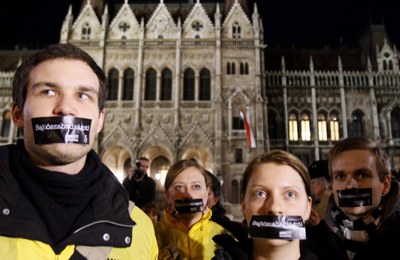New York, March 11, 2011–The Committee to Protect Journalists calls on Hungarian and European Union authorities to continue to modify a restrictive media law that parliament amended on Monday to comply with demands made by the European Commission–the institution mandated with monitoring the implementation of EU directives. Experts scrutinizing the law’s modifications say the changes fall short of Hungary’s press freedom commitments as an EU, Council of Europe, and Organization for Security and Co-operation in Europe member.
The law, which demands “balance” of all media, came into force in Hungary on January 1–the same day Budapest assumed the rotating EU presidency. It immediately became the center of a heated debate in Europe.
A CPJ review found that the law contains broad and ambiguous language meant to be interpreted and applied by Hungary’s Media Authority, which is staffed by political appointees. Its scope spans all media–print, broadcast, and online. It imposes hefty fines and penalties (up to suspension of programming) on various media outlets found in violation and imposes excessive registration requirements. In addition to regulating domestic media, the law also applies to content “aimed at the territory of Hungary.”
The Media Authority is staffed with appointees of the Hungarian Parliament, which is currently two-thirds filled with members of the ruling party, Fidesz.
“With these amendments, the Hungarian government is merely paying lip service to upholding fundamental principles of press freedom enshrined in the European Union,” CPJ Europe and Central Asia Program Coordinator Nina Ognianova said. “The Hungarian government must work with everyone in the press freedom community to bring this law in line with EU’s Charter of Fundamental Rights, a binding guarantee of freedom of expression.”
The new amendments remove the demand for balance from Internet sites and blogs; it continues to apply to print and broadcast media, Reuters reported. The modifications also narrow the Hungarian authorities’ restrictive rights over international media working in Hungary. While registration requirements are alleviated, they are still in place, Deutsche Presse-Agentur reported. Similarly, a ban on offensive content, Reuters said, was softened but not scrapped.
In a statement Tuesday, OSCE Representative on Freedom of the Media Dunja Mijatović said Hungary had missed an opportunity to fulfill its international commitments on freedom of expression. “The legislation can still be misused to curb alternative and differing voices in Hungary despite modifications adopted following a request from the European Commission,” Mijatović said.
European Commissioner for Digital Agenda Neelie Kroes, who worked with the Hungarian government on amending the legislation said on Monday that the European Commission will be “quite active in monitoring” the law’s implementation, The Associated Press reported. On Thursday, the European Parliament approved a resolution to call for further revisions.
